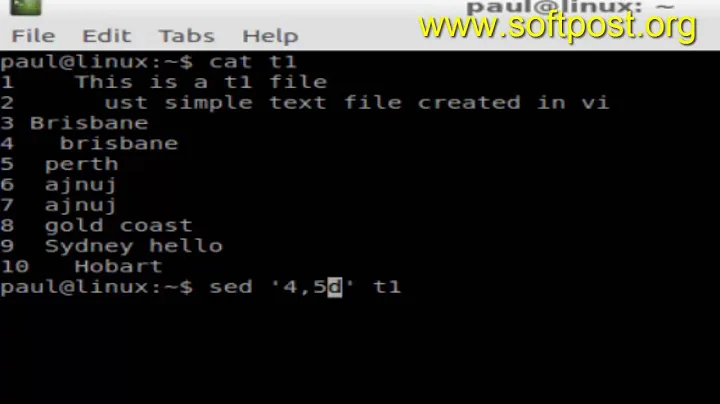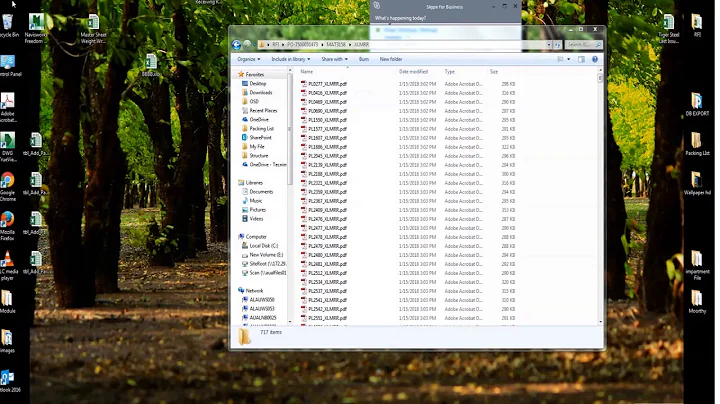print specific line from multiple files
157
Solution 1
awk 'FNR==27 {print FILENAME, $0}' *.txt >output.txt
FILENAMEis built-in awk variable for current input file nameFNRrefer to line number of current file$0means whole line
Solution 2
Another possibility is :
for i in * ; do echo -n $i" : " ; head -n 27 "$i" | tail -n 1 ; done > output.txt
Solution 3
Using a for loop:
{ for i in *.txt; do echo "$i : $(sed -n '27p' "$i")"; done ;} >output.txt
The for loop may be expensive as you have 5000+ files but given the current hardwares should not be a problem.
Faster way, quitting sed after line 27 (thanks @Fiximan):
{ for i in *.txt; do echo "$i : $(sed -n '27p;q' "$i")"; done ;} >output.txt
Related videos on Youtube
Author by
Joey
Updated on September 18, 2022Comments
-
 Joey over 1 year
Joey over 1 yearHere is the source code of a historical Unix goto.c: http://v6shell.org/history/goto.c
So we're trying to find a matching label recording the "goto label" call.
My problem:
if (getlin(line)) { write(1, "label not found\n", 16); return; }So I would expect if getlin() returns true we should print out "label not found" and exit the program.
But look at this:
getlin(s) char s[]; { int ch, i; i = 0; l: if ((ch=getc())=='\0') return(1); if (ch!=':') { while(ch!='\n' && ch!='\0') ch = getc(); goto l; } while ((ch=getc())==' '); while (ch!=' ' && ch!='\n' && ch!='\0') { s[i++] = ch; ch = getc(); } while(ch != '\n') ch = getc(); s[i] = '\0'; return(0); }getlin() will return 0(true) if we found the label and 1(false) if we didn't.
But it should be the other way around or we would need to say:
if (**!** getlin(line)){}What is wrong here?
-
 arkascha over 9 yearsNot sure what this is about, but as a general rule of thumb: unix utilities traditionally return 0 (zero) to indicate success, everything else indicates an error (an error code). So I#d say the function implementation makes sense, the conditional is questionable.
arkascha over 9 yearsNot sure what this is about, but as a general rule of thumb: unix utilities traditionally return 0 (zero) to indicate success, everything else indicates an error (an error code). So I#d say the function implementation makes sense, the conditional is questionable. -
 Joey over 9 yearsYeah that's the question. But it's working, so why does it work?
Joey over 9 yearsYeah that's the question. But it's working, so why does it work?
-
-
FelixJN about 8 yearsWould you need a
'27p;q'to be faster or willsedquit automatically after hitting line 27? -
 123 about 8 years@Fiximan yes that will be quicker
123 about 8 years@Fiximan yes that will be quicker -
 heemayl about 8 years@Fiximan That surely would..edited..thanks..
heemayl about 8 years@Fiximan That surely would..edited..thanks.. -
 Ravi Saini about 8 yearsThanx man this was much better for me.
Ravi Saini about 8 yearsThanx man this was much better for me. -
don_crissti over 5 years@Fiximan - sed would quit so quick that it won't print anything...
-
user1683793 over 2 yearsI set up a file with 500 million 100 byte records and for that case, this version works fastest for me at 1m2.582s followed by the sed version at 1m20.81s and awk at 2m14.756s
-
user1485864 over 2 yearsPlus this is more flexible. If the logs g-zipped you can simply add in the loop the
zcatcommand.






